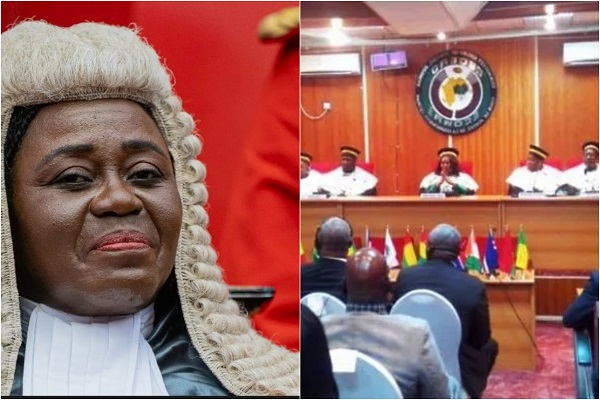The suspended Chief Justice of Ghana, Gertrude Torkornoo, sued the government of Ghana at the Community Court of Justice of the Economic Community of West African States (ECOWAS) over her suspension and the ongoing hearing on three petitions for her removal on July 4, 2025.
Her actions at the ECOWAS Court follow the unanimous dismissal of a similar suit she filed at the country’s apex court, the Supreme Court of Ghana.
Justice Torkornoo, like she did at the Supreme Court, has asked the Community Court to revoke her suspension, stop the ongoing hearing of the three petitions that have been filed for her removal, among other reliefs.
The question now is: will the ECOWAS Court grant her the reliefs that were thrown out by the highest court in Ghana? Does the ECOWAS Court have the power to override a decision made by the Supreme Court of Ghana?
The ECOWAS Court and its mandate:
The ECOWAS Court is an organ of the Economic Community of West African States (ECOWAS), a regional integration community made up of Ghana and 14 other West African states.
Essentially, the court acts as an adjudicative body for countries in the community, and it handles four main types of disputes – those relating to the interpretation, application, or legality of ECOWAS regulations; those that arise between ECOWAS and its employees; those relating to liability for or against ECOWAS; and those that involve a violation of human rights committed by a member state.
In other words, the mandate of the court is to ensure the observance of law and of the principles of equity in the interpretation and application of the provisions of the community’s treaty and all other subsidiary legal instruments adopted by its member states.
The following are listed as the “Contentious Jurisdiction” of the court on its website:
– The Court examines cases of failure by Member States to honour their obligations under the Community law;
– The Court has competence to adjudicate on any dispute relating to the interpretation and application of acts of the Community;
– The Court adjudicates in disputes between Institutions of the Community and their officials;
– The Court has power to handle cases dealing with liability for or against the Community;
– The Court has jurisdiction to determine cases of violation of human rights that occur in any Member State;
– The Court adjudges and makes declarations on the legality of Regulations, Directives, Decisions, and other subsidiary legal instruments adopted by ECOWAS.
What CJ Torkornoo is asking from the Court:
Details of the two applications the suspended Chief Justice filed at the ECOWAS Court show that she is seeking the court’s jurisdiction to determine cases of violation of human rights that occur in member states of the community.
Justice Torkornoo contends that the determination of a prima facie case in the three petitions for her, the decision by President John Dramani Mahama to suspend her, and the actions of the 5-member committee set by the president, which is chaired by Supreme Court Justice Gabriel Scott Pwamang, all violate her human rights.
She wants the court to declare her suspension, the institution of the 5-member committee, as well as the works of the committee, a violation of her human rights.
Recent judgment delivered by the ECOWAS Court against Ghana:
The ECOWAS Court has not shied away from ruling on cases against the government of Ghana.
The court, just this May 2025, ruled against the government of Ghana in a landmark case involving the prolonged detention of 30 members of the Homeland Study Group Foundation (HSGF), awarding a total of $75,000 in damages for violations of their fundamental human rights.
It found that the applicants were held without trial or due legal process for extended periods, some for over a year, following their arrest on May 8, 2019, under Ghana’s 1976 Prohibited Organisations Decree.
Each applicant is to receive $2,500 in the cedi equivalent as compensation for the breach of their rights from the government of Ghana.
The Community Court has also ruled in some cases in favour of the government, with the most recent one being on the Agyapa Royalties deal during the Nana Addo Dankwa Akufo-Addo regime.
In July 2023, the court dismissed the suit against the Agyapa Royalties deal filed by the Ghana Integrity Initiative and Transparency International Ghana against the then-government.
Transparency International, Ghana Integrity Initiative and Ghana Anti-Corruption Coalition asked the court to order the Government of Ghana to stop the sale of the country’s gold royalties through the Agyapa deal.
The court dismissed all the reliefs of the plaintiff, Transparency International, and its subsidiary, the Ghana Integrity Initiative, during a virtual hearing held on July 11, 2023, including the relief that sought the declaration that the Agyapa Royalties deal violated the human rights of the people of Ghana.
Could this court, with its history, provide the needed respite in the law that the suspended Chief Justice of Ghana, Gertrude Torkornoo, is seeking?
BAI/AE
You can also watch the latest news in Twi on GhanaWeb TV below:
Cheque Fraud EXPOSED: How it works and how to stay safe


